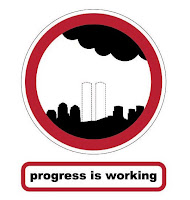In his 1982 essay Progress versus Utopia, or, Can We Imagine the Future? *, Fredric Jameson proposes that the idea of Progress is a particular concept that stems from a "properly capitalist mode of production" and as the consequence of a temporal sense which doesn't recognize the past as an historical necessity to reach the present and scans the future for some ineffable meaning: "Capitalism demands in this sense a different experience of temporality from what was appropriate to a feudal or tribal system, to the polis or to the forbidden city of the sacred despot: it demands a memory of qualitative social change, a concrete vision of the past which we may expect to find completed by that far more abstract and empty conception of some future terminus which we sometimes call 'progress'." (p. 284)
And just as previous world views and temporalities found literary counterparts, such as the historical novel, capitalism found as suited for it's temporal perception, the Science Fiction (SF) genre. That is not to say that SF is apologetic of capitalism, or otherwise, but only that it addresses time as a ductile matter proper to a capitalist perception, one that replaces "the historical by the nostalgic" (p. 285), and fantasizes about the future, sometimes as Utopia, sometimes as Dystopia.
From this, the essay questions if what is being pursued in SF, as an utopian genre, could honestly be seen as attempts of envisioning prospective presents or, as is defended, as a mechanism of unveiling the present in which the writer (and ourselves) are immersed. But don't we see the present close enough? The answer would be that, precisely, we see it too close, enacting some kind of blindness: (...) the present - in this society, and in the physical and psychic dissociation of the human subjects who inhabit it - is inaccessible directly, is numb, habituated, empty of affect. Elaborate strategies of indirection are therefore necessary (...) to break through our monadic insulation and to 'experience', for some first and real time, this 'present', which is after all all we have." (p.286/287)
We should point the critical stance that Jameson stresses towards "this society". Not just the capitalist society, but more specifically to a consumer society "with it's rapid media exhaustion of yesterday's events (...)" (p. 285).
Jameson is speaking from the 1980's: "We have seen that in the moment of the emergence of capitalism the present could be intensified, and prepared for individual perception, by the construction of a historical past from which as a process it could be felt to issue slowly forth, like the growth of an organism. But today the past is dead, transformed into a packet of well-worn and thumbed glossy images. As for the future, which may still be alive in some small heroic collectivities on the Earth's surface (...) seeks to intoxicate itself with images of death that range from the destruction of the world by fire, water and ice to lengthening sleep or the berserk orgies of high-rise buildings or superhighways reverting to barbarism." (p. 287/288) And this just reminded me of writing about Rem Koolhaas' Delirious New York.
It is from this perspective that the final part of the essay addresses SF, as a literary genre that still has the power, not to overcome the status quo, but to make it visible: "(...) what is indeed authentic about it (SF), as a mode of narrative and a form of knowledge, is not at all its capacity to keep the future alive, even in imagination. On the contrary, its deepest vocation is over and over again to demonstrate and to dramatize our incapacity to imagine the future (...) the imagination of otherness and radical difference; to succeed by failure (...) a contemplation of our own absolute limits." (p. 288/289)

The creative product of the utopian SF writer is thus seen as a disclosure of present reality, which may or may not be intentionally done. The limits of this cultural production which we must still see within a capitalist relation remain bound to "the systemic, cultural and ideological closure of which we are all in one way or another prisoners." (p. 289) But within this realm, the SF novel has the possibility, as any other product does, to participate in the current affairs of the world, affecting it and becoming effective as a political horizon of hope beyond "the nightmare of History".
In the end, through the example of the novel Roadside Picnic by the Strugatsky Brothers, we find progress to be one of the "the most archaic longings of the human race", a call to happiness in a technological era, the impossible Utopia, or, what amounts to be the same, the impossible Dystopia.
* in Archaeologies of the Future, The Desire Called Utopia and Other Science Fictions, Verso, 2005






















